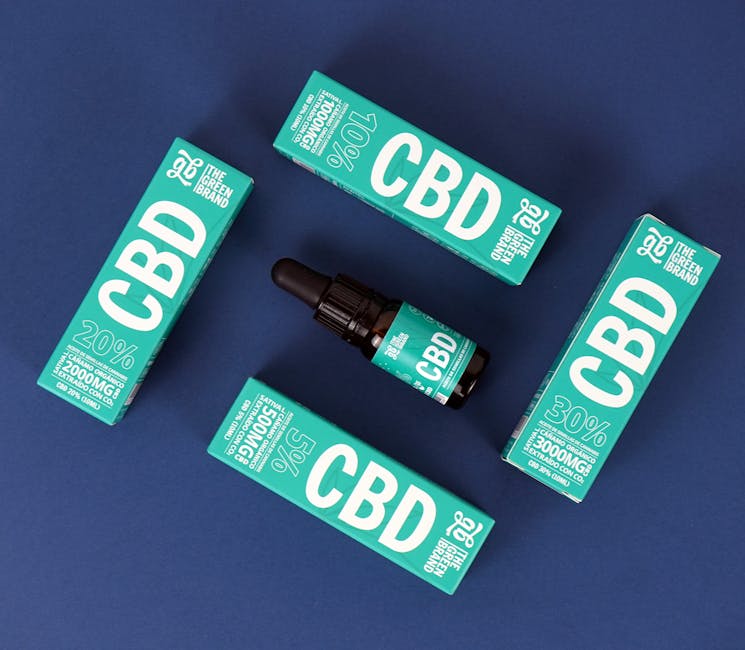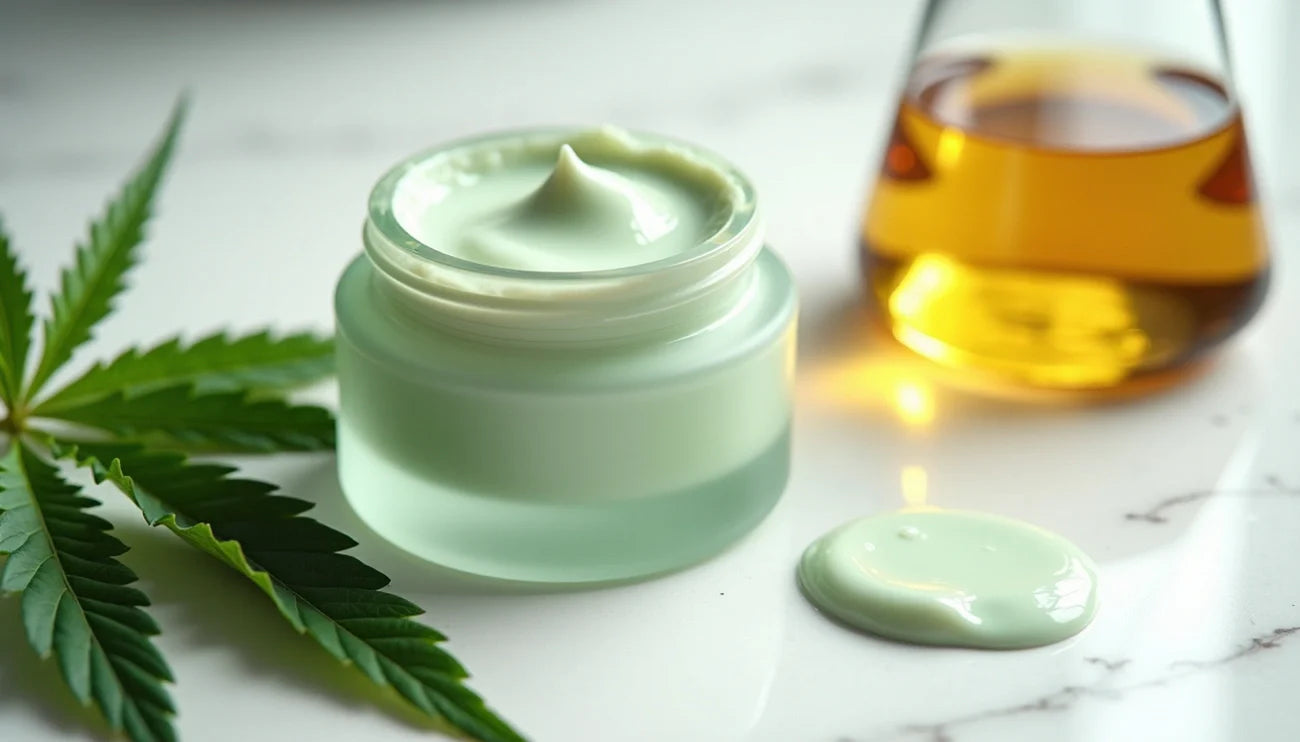Understanding CBD for Stress and Anxiety
CBD for stress and anxiety is gaining popularity as a natural approach to managing the pressures of modern life. Here's what you need to know:
- What it is: CBD (cannabidiol) is a non-intoxicating compound from hemp plants that interacts with your body's endocannabinoid system
- How it works: CBD may help regulate stress responses by affecting serotonin receptors and reducing cortisol levels
- Evidence: Research shows CBD can reduce anxiety in social situations and may help with generalized anxiety, PTSD, and panic disorders
- Safety: CBD is generally well-tolerated with mild side effects like fatigue or digestive changes
- Dosage: Most studies show benefits at 300-600mg, though many start with 20-50mg daily
In today's world, stress and anxiety have become unwelcome companions for millions of Americans. According to recent statistics, anxiety disorders affect approximately 40 million adults in the United States alone, making them the most common mental health concern in the country.
As traditional treatments sometimes come with unwanted side effects or limited efficacy, many people are turning to natural alternatives. CBD for stress and anxiety stands out as one of the most promising options, with mounting scientific evidence supporting its potential benefits.
CBD works differently than conventional medications. Rather than creating dependency or altering brain chemistry dramatically, it appears to work with your body's existing endocannabinoid system - a complex network of receptors that help regulate mood, stress responses, and overall balance.
Research suggests CBD may help by:
- Boosting natural endocannabinoid levels in the body
- Interacting with serotonin receptors (similar to some anti-anxiety medications)
- Promoting relaxation without sedation
- Supporting healthy sleep patterns
- Reducing physical symptoms of stress
As Jacob Dunn, I've spent years researching and developing premium CBD for stress and anxiety solutions at Sow Eden Organics, where we prioritize organic cultivation and advanced extraction methods to create the most effective CBD products possible.
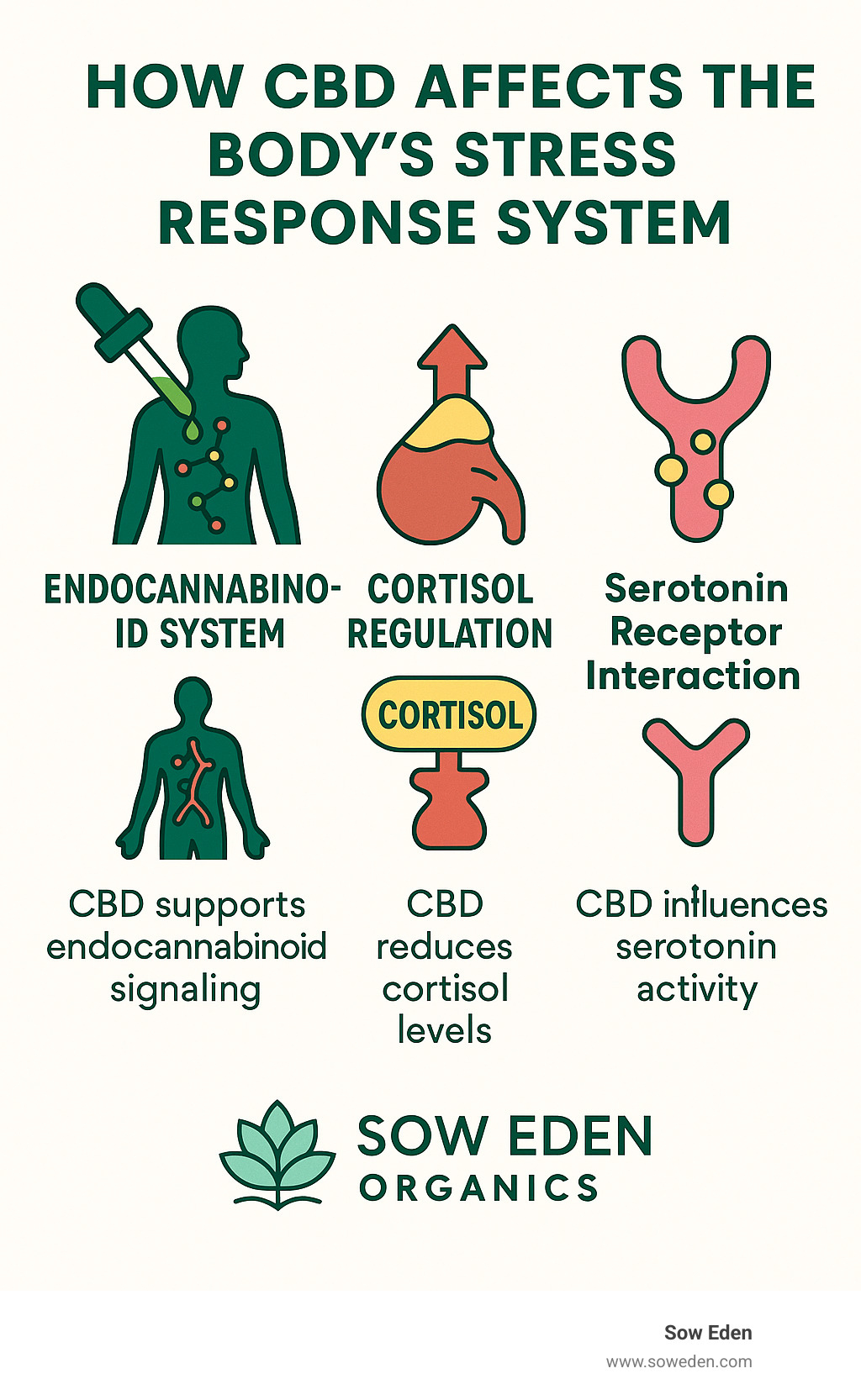
Quick look at CBD for stress and anxiety: - CBD capsules for daily wellness - CBD capsules for pain relief
What Is CBD & How Does It Differ From THC?
Ever wondered what makes CBD so special? Let's break it down in simple terms. CBD, or cannabidiol, is just one of over 100 natural compounds (phytocannabinoids) found in the Cannabis sativa plant. While CBD and THC come from the same plant family, they're more like distant cousins with very different personalities.
Hemp and marijuana are both varieties of Cannabis sativa, but there's a critical difference that matters legally: hemp contains 0.3% or less THC by dry weight, while marijuana contains more. This distinction became super important after the 2018 Farm Bill, which essentially gave hemp-derived CBD the green light federally (though state laws can still vary).
CBD for stress and anxiety products that come from hemp won't get you "high" – they're non-intoxicating. This makes CBD particularly appealing if you're looking for potential relief without any mind-altering effects that might interfere with your daily life.
Have you heard about the "entourage effect"? It's a fascinating concept suggesting that cannabinoids work better as a team than solo performers. Full-spectrum CBD products contain multiple cannabinoids (including tiny amounts of THC), terpenes, and other beneficial plant compounds that may work together harmoniously – like a well-rehearsed orchestra rather than a solo act.
Chemical Structure 101
Though CBD and THC might seem like twins on paper – both sharing the exact same molecular formula (C₂₁H₃₀O₂) and weight (314.5 g/mol) – their atoms are arranged differently. This subtle structural variation makes all the difference in how they interact with our bodies.
Think of it like two similar keys that fit into the same lock. One key (THC) turns the lock completely, while the other (CBD) only partially engages it or engages it differently. This structural difference explains why THC produces those psychoactive effects while CBD takes a gentler approach.
Why CBD Won't Get You "High"
The main reason CBD doesn't leave you feeling intoxicated comes down to how it interacts with your body's CB1 receptors in the endocannabinoid system. THC binds directly and strongly to these receptors, particularly in the brain, fully activating them and creating that sensation of being "high."
CBD, however, is much more subtle. It has a low affinity for CB1 receptors and acts as a partial agonist or even an antagonist in some cases. Rather than barging in and taking over like THC, CBD gently influences how other compounds interact with these receptors and works through multiple pathways in your body.
This difference in receptor interaction gives CBD an impressive safety profile. According to the World Health Organization, CBD shows no effects that would indicate abuse or dependence potential in humans, and there's no evidence of public health problems associated with using pure CBD.
So while both compounds come from the same plant family, CBD offers a completely different experience – one that's becoming increasingly popular for those seeking natural wellness support without the high.
How CBD Works Inside the Body to Tame Stress Signals
Ever wonder how CBD for stress and anxiety actually works its magic? Let's explore the fascinating world happening inside your body when CBD enters the picture.
At the heart of this story is your endocannabinoid system (ECS) – a remarkable network finded in the 1990s that helps keep your body in balance. Think of it as your body's built-in stress management system that regulates everything from mood and sleep to how you respond to stress.
Your ECS has three main components: naturally-produced cannabinoids (called endocannabinoids), receptors these molecules bind to, and enzymes that break them down. The two key receptors in this system are:
- CB1 receptors - mainly in your brain and central nervous system
- CB2 receptors - predominantly in your immune system and throughout your body
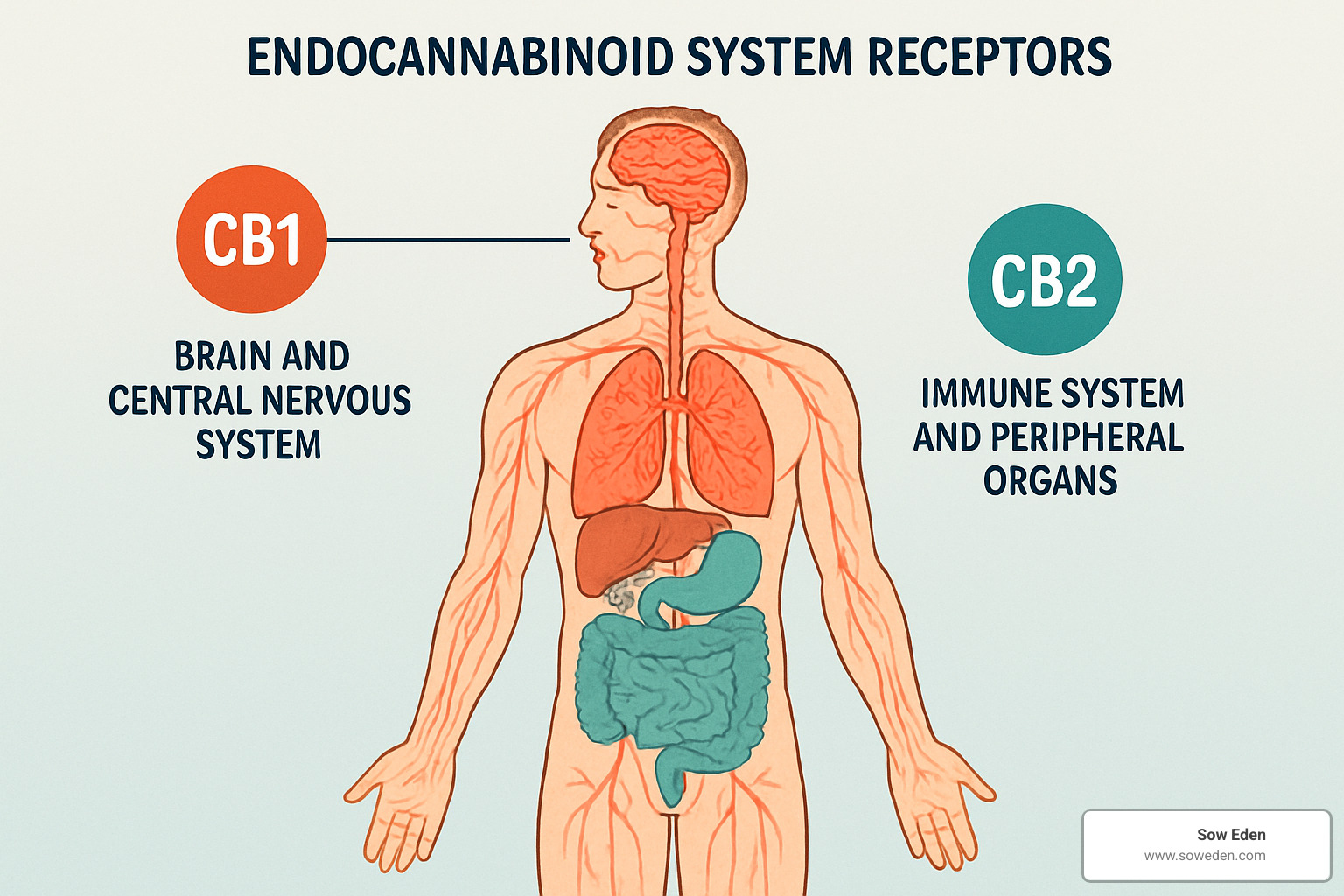
What makes CBD special is how it interacts with this system. Unlike THC, which binds directly to receptors, CBD takes a more subtle approach. It works like a gentle coach rather than a dictator. CBD inhibits an enzyme called FAAH that normally breaks down anandamide (often called your "bliss molecule"). By preserving more anandamide in your system, CBD helps extend those natural good feelings.
But CBD doesn't stop there. It's a multi-tasker that also connects with other important receptors:
5-HT1A receptors – these serotonin receptors play a huge role in your mood and happiness. CBD's interaction here may explain why many people feel a sense of calm when using it.
TRPV1 channels – involved in pain perception and inflammation, CBD's influence here may help reduce physical symptoms of stress.
GPR55 receptors – sometimes called the "third cannabinoid receptor," CBD's modulation here may contribute to its balancing effects.
The Endocannabinoid System & Stress Response
When stress hits, your body activates what scientists call the HPA axis (hypothalamic-pituitary-adrenal). This triggers the release of corticotropin-releasing hormone and eventually cortisol – that stress hormone we've all heard about.
Your endocannabinoid system acts like a brake on this stress response. It helps prevent your body from overreacting to stressors. CBD for stress and anxiety seems to strengthen this natural braking system by preserving anandamide (remember that bliss molecule?).
By inhibiting the FAAH enzyme that breaks down anandamide, CBD helps keep more of this natural stress-buffer circulating in your system. It's like extending the life of your body's own natural chill pill. CBD may also influence how your body processes cortisol, potentially helping to regulate the glucocorticoid feedback loop that can sometimes get stuck in "high stress" mode.
CBD for Stress and Anxiety: Neurochemical Pathways
Beyond the ECS, CBD influences several brain pathways that directly affect how you experience stress and anxiety:
Serotonin Modulation: CBD gently interacts with your 5-HT1A receptors, which help regulate serotonin – your body's natural mood stabilizer. Many prescription anti-anxiety medications target this same system, but CBD does it in a more subtle way. This might be why people report feeling calmer without feeling drugged or "out of it."
GABA Improvement: GABA is your brain's main inhibitory neurotransmitter – essentially your mental brakes. When GABA is working well, you feel relaxed and peaceful. CBD appears to improve GABA's calming effects, helping quiet the mental chatter that often accompanies anxiety.
Amygdala Calming: Your amygdala is like your brain's alarm system – it processes fear and threats. Brain imaging studies show that CBD can actually reduce blood flow to this area, potentially helping to quiet an overactive fear response. Just a single dose of CBD has been shown to reduce how strongly the amygdala reacts to anxiety-provoking situations.
What makes CBD for stress and anxiety so interesting is that it doesn't just target one pathway – it works through multiple complementary mechanisms. Rather than forcing a single change, CBD seems to gently nudge various systems back toward balance. This might explain why it shows promise for so many different types of anxiety and stress responses.
Scientific Evidence: What Studies Say About CBD for Stress and Anxiety
The science behind CBD for stress and anxiety has grown impressively in recent years, with researchers increasingly intrigued by its potential to help calm our nervous systems naturally. Let's explore what the studies are actually showing us.
Back in 2015, a comprehensive review in Neurotherapeutics analyzed all the available research on CBD for anxiety disorders. Their conclusion? The evidence strongly supports CBD as a potential treatment for several conditions including generalized anxiety disorder, panic disorder, social anxiety disorder, OCD, and PTSD. That's quite the endorsement from the scientific community!
When it comes to human studies (the gold standard of research), the results are equally promising. Clinical trials have shown that CBD for stress and anxiety works best in doses ranging from 300mg to 600mg. At these amounts, CBD has successfully reduced experimentally induced anxiety in healthy volunteers and decreased anxiety symptoms in people diagnosed with social anxiety disorder.

One of the most compelling aspects of CBD is how it compares to traditional anxiety medications. While conventional pharmaceuticals certainly have their place, they often come with unwanted baggage – side effects like dependence, sexual dysfunction, and sometimes difficult withdrawal symptoms. CBD, on the other hand, is generally well-tolerated with minimal side effects for most people.
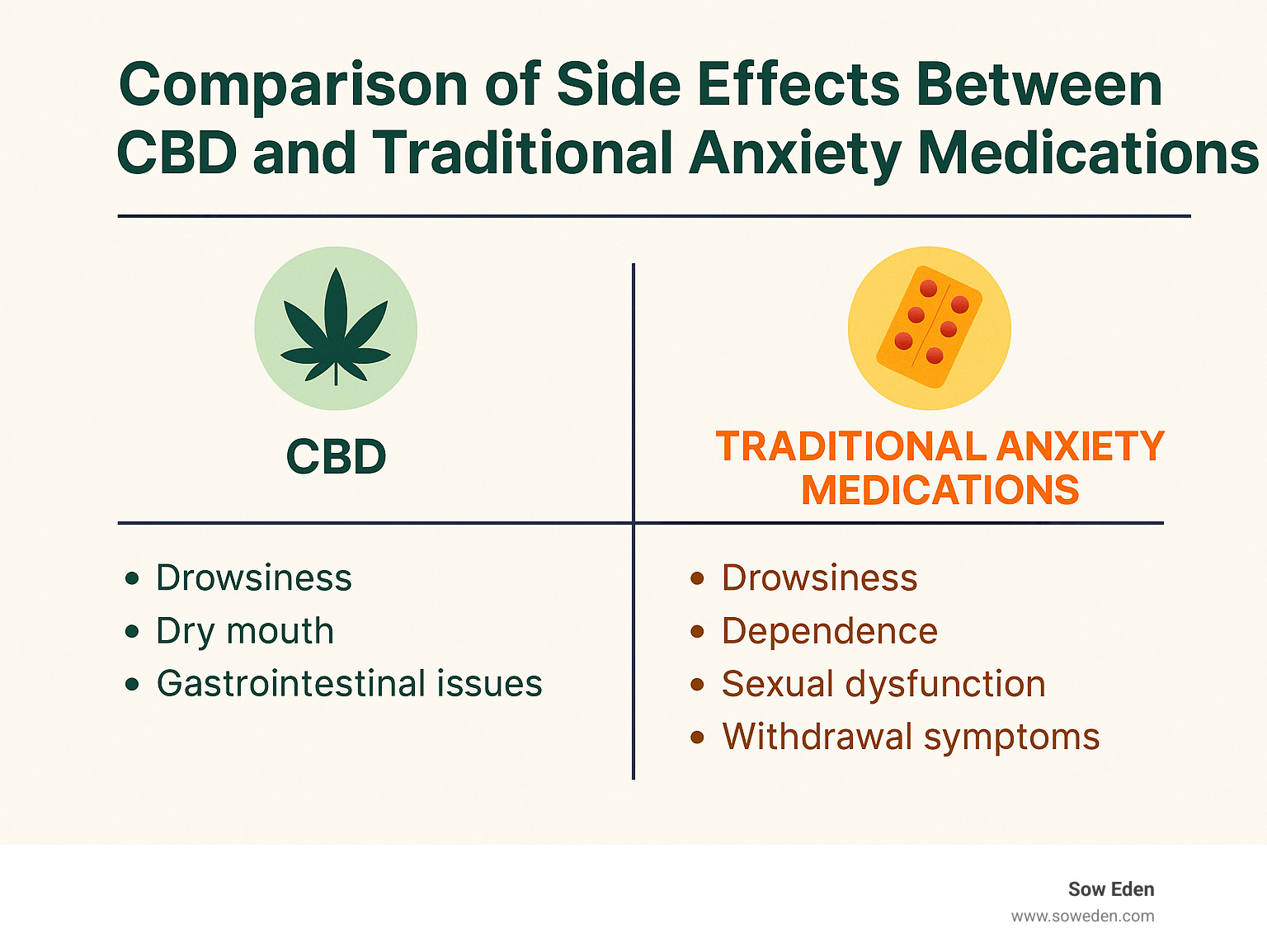
CBD for Stress and Anxiety — Key Human Trials
Several human studies stand out when looking at the evidence for CBD for stress and anxiety:
Feeling of dread before giving a speech? A fascinating 2011 study published in Neuropsychopharmacology examined exactly this scenario. People with social anxiety disorder who took a single 600mg dose of CBD before a public speaking test experienced significantly less anxiety, cognitive impairment, and discomfort compared to those who received a placebo. Imagine facing your fear of public speaking with that kind of natural support!
More recently, a 2019 study in The Permanente Journal followed 72 adults taking CBD (25-175mg daily) for one month. The results? Nearly 80% of participants reported lower anxiety scores, with benefits lasting throughout the study. That's significant relief for people struggling with daily anxiety.
Even more encouraging is a groundbreaking 2022 open-label trial that found young people with treatment-resistant anxiety disorders showed meaningful improvement after adding CBD to their treatment plan. This suggests that CBD for stress and anxiety might help even when other approaches haven't worked.
Adding to this evidence, a substantial 2023 randomized trial with 300 anxiety sufferers compared CBD-dominant cannabis products to THC-dominant and balanced products. Those using CBD-dominant options showed the most significant improvements in anxiety symptoms, further confirming CBD's specific benefits for anxiety management.
Disorder-Specific Findings
Research has looked at CBD's effects across various anxiety disorders with promising results:
For Generalized Anxiety Disorder (GAD), the constant worry that disrupts daily life, preclinical studies consistently show that CBD reduces both behavioral and physiological measures of stress and anxiety. While human studies are still developing, early evidence suggests CBD may help reduce the persistent tension and worry that characterizes GAD.
Some of the strongest human evidence for CBD for stress and anxiety comes from studies on Social Anxiety Disorder (SAD). Beyond the public speaking test mentioned earlier, brain imaging studies have shown that CBD actually reduces activity in the amygdala – the brain's fear center – and other regions involved in processing social threats.
For those suffering from Post-Traumatic Stress Disorder (PTSD), CBD shows promise through several mechanisms, including helping extinguish fear memories and preventing their reconsolidation. In one small but notable study, 91% of PTSD patients experienced decreased symptom severity when CBD was added to their treatment regimen.
Research on Obsessive-Compulsive Disorder (OCD) and Panic Disorder is still emerging, but preclinical evidence is encouraging. Animal studies show CBD reduces both compulsive behaviors and panic responses, suggesting potential benefits for humans with these conditions.
While these findings give us reason for optimism, it's worth noting that many human studies have been limited to short-term dosing and relatively small sample sizes. Larger, longer-term studies are still needed to fully understand how CBD for stress and anxiety works across different disorders and populations.
Science continues to uncover the natural potential of CBD, and at Sow Eden, we're passionate about bringing these benefits to you through carefully crafted, premium organic CBD products. For more information about anxiety prevalence and treatment, you can explore scientific research on anxiety prevalence.
Using CBD Safely: Dosage, Delivery, Side Effects & Interactions
Finding your sweet spot with CBD for stress and anxiety is a bit like finding your perfect cup of coffee – it takes some experimentation and patience to get it just right.
The golden rule when starting your CBD journey is "start low and go slow." While researchers often use doses between 300-600mg in clinical settings, most folks begin with much more modest amounts – typically 20-50mg daily – and gradually adjust until they find what works best for their body.
Your CBD experience will vary depending on how you take it:

Sublingual oils or tinctures slip under your tongue for about a minute before swallowing, typically kicking in within 15-30 minutes and providing comfort for 4-6 hours. Vegan CBD capsules offer convenience and precision – pop one with breakfast, and though they take 30-90 minutes to work their magic, the effects often last 6-8 hours. Inhaling CBD through vaping delivers almost immediate relief but for a shorter duration (about 2-3 hours), while topicals work wonders for localized tension but aren't the go-to for anxiety relief.
CBD is generally gentle on the body, but some folks might notice mild effects like feeling a bit sleepy, having a dry mouth, experiencing slight digestive changes, or subtle shifts in blood pressure. These usually fade as your body adjusts.
One important heads-up: CBD can interact with liver enzymes called cytochrome P450 (CYP450), which help process many medications. Think of it like the "grapefruit effect" – just as grapefruit can affect how your body handles certain medicines, CBD might do the same. This is especially relevant if you take prescription medications regularly.
For expectant or nursing mothers, it's best to wait on CBD until research catches up – we simply don't have enough data yet to confirm it's completely safe during these special times.
Practical Dosing Guide for CBD for Stress and Anxiety
Finding your personal CBD balance might take some fine-tuning. Here's a friendly roadmap:
Some people thrive on micro-doses (5-10mg) sprinkled throughout the day – this gentle approach helps maintain steady calm without overwhelming your system. For many, the sweet spot falls between 25-50mg daily, often divided into morning and evening doses. Clinical research frequently explores higher ranges (100-600mg), particularly for significant anxiety, but these levels should be approached gradually and ideally with healthcare guidance.
At Sow Eden, we often suggest starting with our standard 25mg vegan CBD capsules once daily with a meal containing healthy fats (think avocado toast or a handful of nuts) to boost absorption. After a week of consistent use, check in with yourself – how are you feeling? Adjust accordingly.
Timing matters too. Morning doses often help manage daytime jitters without making you drowsy, while evening doses can ease you into a peaceful night's sleep. Many people find that dividing their daily amount (perhaps morning and evening) provides the most consistent relief throughout their day.
CBD builds up in your system over time. Consistency often yields better results than occasional use, so think of it as a daily practice rather than an as-needed quick fix.
Medication Interactions & When to Consult Your Doctor
Having an open conversation with your healthcare provider about CBD for stress and anxiety is crucial, especially if you're taking other medications. Some important potential interactions to be aware of:
Benzodiazepines like Xanax or Valium might pack an extra relaxing punch when combined with CBD – potentially too much of a good thing. While many people successfully use CBD alongside antidepressants like SSRIs, it's something that deserves professional monitoring. Blood thinners such as Warfarin might become more potent with CBD in the mix, as CBD can slow how quickly your body processes these medications. And if you take blood pressure medications, CBD might improve their effects, potentially causing your numbers to dip lower than intended.
Be transparent with all your healthcare providers about your CBD use – especially before surgery or when starting new prescriptions. This honesty allows them to keep a watchful eye on how everything works together and make adjustments if needed.
CBD isn't a replacement for prescribed medications, but rather a potential complement to your overall wellness approach. The goal is finding harmony between traditional and plant-based support for your unique body and mind.
How to Choose a Quality CBD Product for Anxiety Relief
Navigating the ever-expanding CBD marketplace can feel overwhelming when you're looking for relief. Not all CBD for stress and anxiety products are created equal, and finding quality matters. Let's explore what separates the truly beneficial products from the rest.
Trust is built on transparency, which is why third-party lab testing should be your non-negotiable starting point. Reputable companies provide Certificates of Analysis (COAs) from independent laboratories that verify exactly what's in your product. These tests confirm the actual cannabinoid content matches what's on the label and, crucially, verify the absence of harmful contaminants like pesticides, heavy metals, and solvents.
The journey to quality CBD for stress and anxiety actually begins in the soil. Organic hemp cultivation ensures your CBD comes from plants grown without harmful pesticides or chemical fertilizers. This matters because hemp plants are natural bioaccumulators – they enthusiastically absorb substances from their environment, whether beneficial nutrients or potentially harmful chemicals.
How your CBD is extracted from the hemp plant significantly impacts its quality. CO2 extraction stands as the gold standard because it doesn't require harsh chemical solvents and preserves the plant's beneficial compounds in their most natural state.
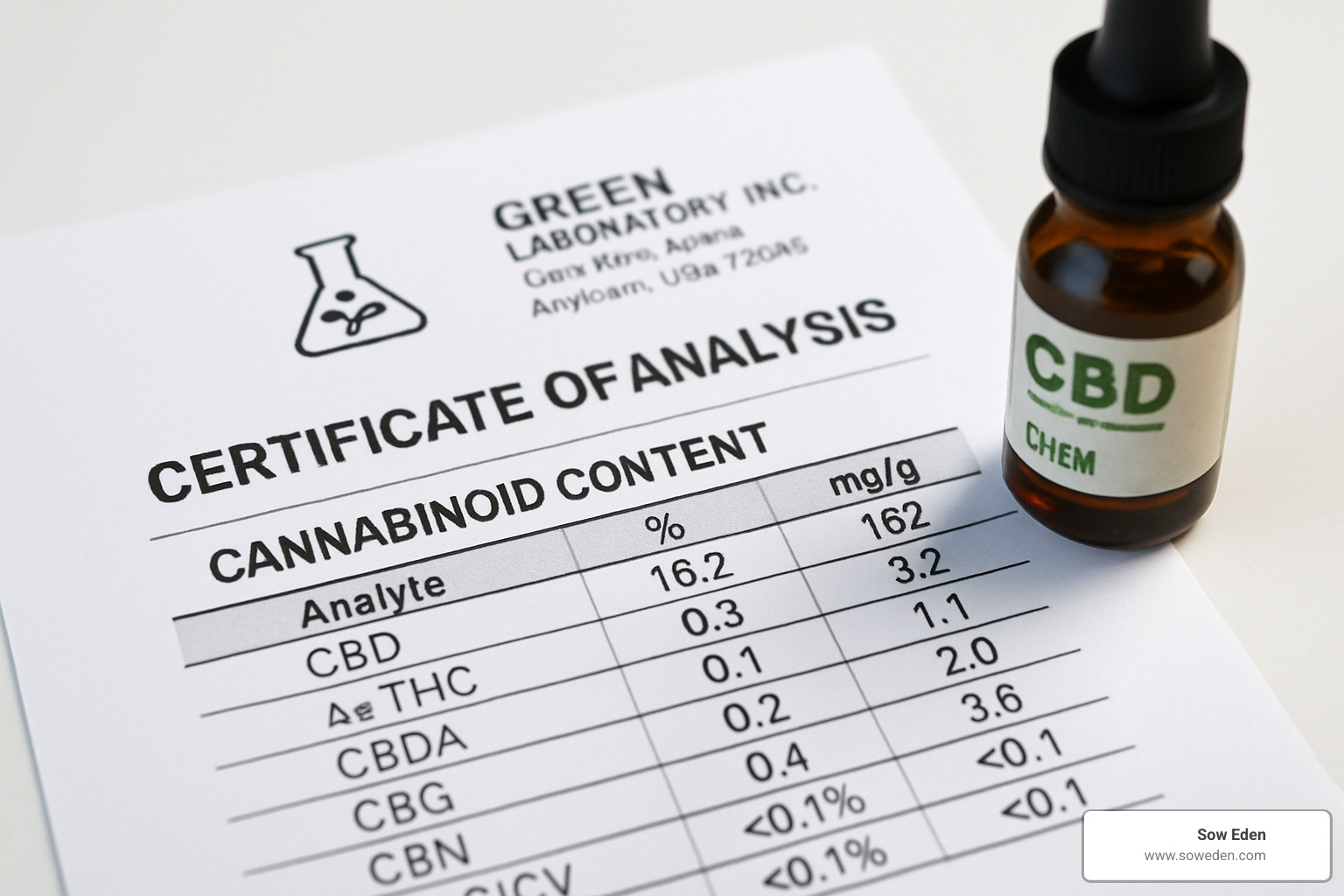
When selecting your ideal product type, you'll encounter three main options:
Full-spectrum CBD contains all cannabinoids naturally present in hemp, including trace amounts of THC (less than 0.3%), along with beneficial terpenes and flavonoids. Many find this offers the most complete relief due to the "entourage effect" – where these compounds work synergistically to improve benefits.
Broad-spectrum CBD offers a middle ground, providing multiple cannabinoids and terpenes but with THC removed. This appeals to those wanting comprehensive benefits without any THC exposure.
CBD isolate contains pure cannabidiol with all other compounds removed, offering the most straightforward option for those who prefer simplicity or have sensitivities to other cannabinoids.
For addressing anxiety specifically, many people report more profound relief with full-spectrum products, though your personal needs and comfort level with trace THC should guide your choice.
Why Vegan CBD Capsules Are Trending
There's a reason vegan CBD capsules have surged in popularity – they solve several common challenges people face when incorporating CBD into their wellness routines.
The discreet, convenient nature of capsules makes them perfect for managing anxiety in any setting. Whether you're at work, traveling, or simply prefer not to draw attention to your wellness routine, capsules slip easily into your day without requiring any special handling or equipment.
Dosing becomes wonderfully simple with capsules. Each one contains a precise amount of CBD, eliminating the guesswork that can come with oils or tinctures. This consistency helps you find your optimal dose more quickly and maintain it reliably.
For those who find the earthy flavor of hemp products challenging (and many do!), capsules offer a completely taste-free experience. The botanical benefits without the botanical taste.
The digestive process involved with capsules often creates a more gradual, extended release of CBD into your system. This can provide longer-lasting relief throughout the day, which is particularly beneficial for managing persistent anxiety.
At Sow Eden, our vegan CBD capsules blend organic hemp-derived CBD with complementary botanicals like Ginger Root and Lemon Peel. These natural additions not only support immune function but may improve the overall calming effects you're seeking.
Red Flags on Labels
Being an informed consumer means knowing what warning signs to watch for when shopping for CBD for stress and anxiety:
Mislabeling remains disturbingly common. A concerning 2017 study found nearly 70% of online CBD products contained significantly different amounts of CBD than advertised – either more or less. This reinforces why verified third-party testing is essential.
THC content exceeding 0.3% crosses an important legal boundary. Hemp-derived CBD products must stay below this threshold; anything higher technically becomes a marijuana product, which faces different regulations depending on your state.
Synthetic cannabinoids sometimes appear in inferior products and can pose serious safety risks. Always choose products derived from natural hemp plants rather than lab-created compounds.
Be wary of outlandish health claims. Legitimate companies avoid making unsubstantiated promises about "curing" anxiety or other conditions. Look for balanced, educational information instead.
Contaminant presence like heavy metals, pesticides, or residual solvents should immediately disqualify a product from consideration. Quality COAs specifically test for these potential hazards.
By thoughtfully evaluating these factors, you'll be much better positioned to find a high-quality CBD product that delivers genuine relief while minimizing potential risks. Your journey toward natural wellness deserves nothing less than the highest standards.
Frequently Asked Questions about CBD & Anxiety
Can CBD make anxiety worse?
While most people find relief using CBD for stress and anxiety, a small percentage might experience the opposite effect. This typically happens with products containing higher THC levels, which is why CBD-dominant formulations with minimal THC are generally recommended for anxiety management.
Interestingly, research points to CBD following what scientists call a bell-shaped dose-response curve. This means there's a "sweet spot" for dosing – after you reach your optimal dose, taking more CBD won't necessarily increase the benefits and might actually reduce effectiveness. This differs from developing tolerance, where you'd need increasingly larger amounts to feel the same effects.
If you notice your anxiety increasing after taking CBD, try these adjustments:
- Lower your dosage – sometimes less is more
- Switch to a broad-spectrum or isolate product that contains no THC
- Take your CBD with a small meal to slow absorption
- Experiment with a different delivery method (capsules instead of oil, for example)
How long does CBD take to work for stress?
The timeline for feeling the effects of CBD for stress and anxiety varies depending on how you take it:
Sublingual oils work relatively quickly, with effects beginning within 15-30 minutes. This happens because the CBD absorbs directly into your bloodstream through the tiny blood vessels under your tongue, bypassing the digestive system.
Our vegan CBD capsules typically take 30-90 minutes to kick in since they need to pass through your digestive system first. While this means a slower onset, many people appreciate the longer-lasting, more consistent effects they provide.
For immediate relief, vaporized CBD acts almost instantly (within minutes), though the effects don't last as long as other methods.
Beyond these immediate effects, the full benefits of CBD for stress and anxiety often develop gradually with consistent use. Many of our customers report that it takes 2-4 weeks of regular use before they notice significant improvements in their baseline anxiety levels. This happens as CBD accumulates in your system and begins to more effectively regulate your endocannabinoid system.
Is CBD safe for long-term daily use?
Current evidence suggests that CBD is generally well-tolerated for ongoing use. The World Health Organization conducted a comprehensive review and concluded that CBD shows no effects suggesting abuse or dependence potential. They also noted "no evidence of recreational use of CBD or any public health-related problems associated with the use of pure CBD."
Clinical studies have shown that CBD is well-tolerated across a wide range of doses – up to 1500 mg per day orally – without causing psychomotor slowing, negative mood effects, or vital sign abnormalities.
If side effects do occur with long-term use, they're typically mild and may include:
Feeling tired or changes in alertness Digestive issues like mild diarrhea or reduced appetite Dry mouth Potential interactions with certain medications
At Sow Eden, safety is our priority. We use only premium organic hemp and provide detailed third-party testing results for every batch. Our vegan CBD capsules are specifically formulated for daily use as part of a holistic wellness routine, with carefully calibrated doses that balance effectiveness with minimal side effects.
It's worth noting that research on very long-term CBD use (spanning years) is still developing, so we always recommend keeping your healthcare provider informed about your CBD regimen, especially if you take other medications regularly.
Conclusion
Throughout this article, we've explored the promising potential of CBD for stress and anxiety management. From its interaction with the endocannabinoid system to the growing body of scientific evidence supporting its calming effects, CBD offers a natural approach to finding balance in our often overwhelming world.
The research suggests that CBD works through multiple pathways in the body to help regulate stress responses, influence serotonin signaling, and reduce both the physical and mental symptoms of anxiety. With fewer side effects than many conventional options, it's easy to see why so many people are incorporating CBD into their daily wellness routines.
At Sow Eden, we believe true wellness comes from a holistic approach. That's why our premium organic CBD products feature complementary botanicals like Ginger Root and Lemon Peel, which support immune function while working alongside CBD's calming properties. Our unique combination offers a comprehensive approach to managing stress and supporting your overall wellbeing.
When adding CBD for stress and anxiety into your life, keep these key points in mind:
Start with a low dose and gradually increase until you find what works best for you. Choose high-quality, third-party tested products that provide transparency about what's inside. Consider full-spectrum formulations that harness the power of the entourage effect, and be consistent with your CBD routine, as benefits often build over time.
CBD works best as part of a complete wellness strategy. Combining your CBD regimen with regular exercise, mindfulness practices, and proper sleep creates a foundation for lasting resilience against life's challenges.
While CBD isn't a cure-all for eliminating stress and anxiety, it represents a valuable tool in your wellness toolkit. By working with your body's natural systems rather than overriding them, CBD offers a gentle yet effective approach to finding calm amid chaos.
For those interested in exploring our thoughtfully formulated products designed specifically to support stress management and overall wellness, we invite you to learn more about our vegan CBD capsules and find the Sow Eden difference.
Your journey to wellness is personal and ongoing. We're honored to be part of your path toward balance, calm, and holistic health.

